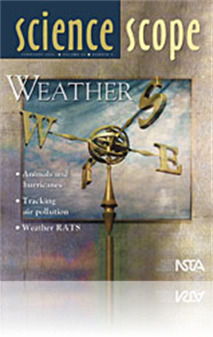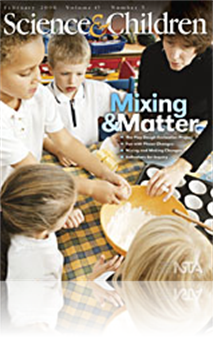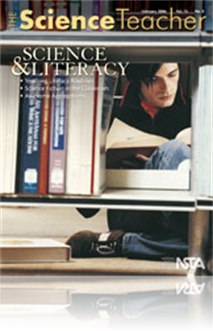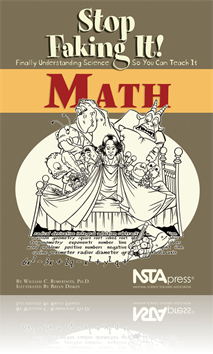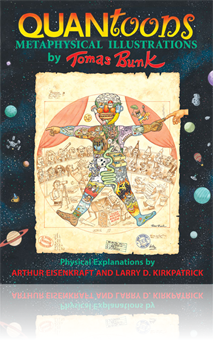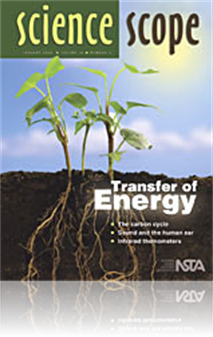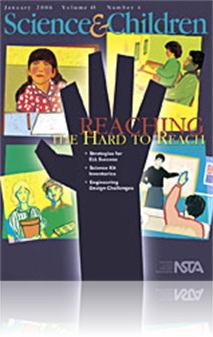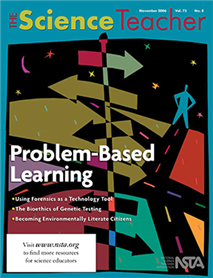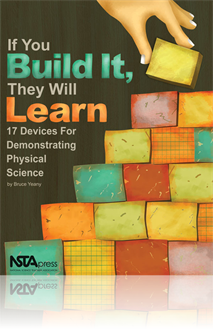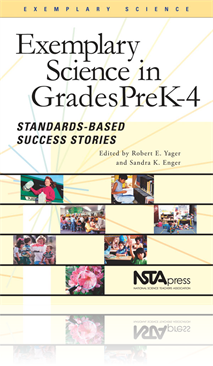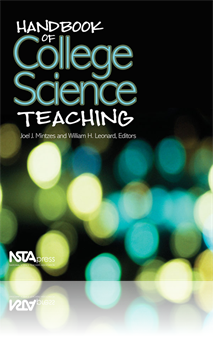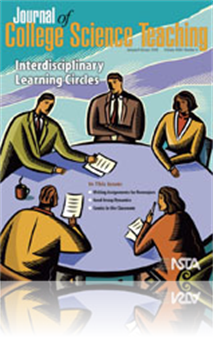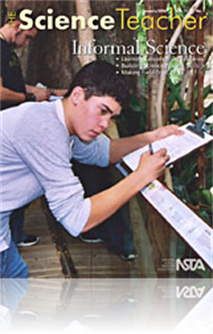All Resources
Journal Article
A New World View, a composition of pale blue glass and steel, is an homage to the most famous scientist in modern history -- Albert Einstein. View this masterpiece for yourself by visiting the World Year of Physics (WYP) team's website that includes ...
Journal Article
Science Shorts: The Dynamics of Dissolving
Dissolving is as much about the substance doing the dissolving (the solvent) as it is about the substance being dissolved (the solute). Dissolving depends on the interaction between the molecules of solvents and solutes. This article looks at the m...
Journal Article
Enabling All Students to Learn Science
Communicating with students in today's high school science classroom is challenging for teachers because the majority of them speak only English. Many of their students, however, do not speak English as their primary language. One way to bridge the g...
Journal Article
What Happens to Animals during Hurricanes?
Student curiosity provides a springboard for discussions ranging from weather, to conservation, to biology, and concern for animal welfare. Teachers can use these real-world events that spark students' interest to integrate content and interdisciplin...
Journal Article
Methods and Strategies: Evidence Helps the KWL Get a KLEW
This article discusses the Know-Learning-Evidence-Wonder (KLEW) chart, a modification on the Know-Want-Learn (KWL) chart. This new chart was developed to align itself with the National Science of Education Standards while also helping to alter the p...
Journal Article
Ask the Experts -- February 2006
In this month's Ask the Experts column, the following questions are addressed, "Why does the Moon show phases when viewed from Earth, but Earth always looks the same from the Moon, with only the top half illuminated?" and "Why are there two tides per...
Journal Article
Science Fiction & Science Literacy
Science fiction is read not only for enjoyment, but because it digs into scientific concepts with imagination, creativity, and a thorough appreciation of consequence. It has so much to offer in terms of good science and how science works, while at th...
Journal Article
Literacy in Science: A Natural Fit
Reading is an essential part of science literacy, but what, when, and how can we incorporate reading in the science classroom? To address these questions and bring reading back into the science classroom, the authors designed four inquiry-based, quar...
Journal Article
Science Sampler: Handmade weather instruments
For students to truly understand the science behind weather phenomena, they should be familiar with such physical concepts as the movement of molecules in solids, liquids, and gases; the relationship between temperature and pressure; and the transfer...
Journal Article
Teaching Through Trade Books: Exploring Your Environment
February is one of those months that is at the halfway point between the cold of the winter and the promise of the spring. It also offers a great time for students to begin to make initial observations about an area and then follow this area through...
Journal Article
Science Sampler: The Hot Zone: An interdisciplinary project on viruses
This integrated language arts and science project is based on selected parts of The Hot Zone by Richard Preston. Students read the parts of the book that concentrate on the scientific process of working with hot agent viruses, as well as the decision...
Journal Article
The Early Years: Nurturing Young Chemists
Chemistry explorations in early childhood classrooms often involve baking, mixing, or dissolving, during which students predict outcomes and try to replicate the results. The objective is to help students come to an understanding that even though we...
Journal Article
Editor's Corner - Science Literacy: Then and Now
The history of science is also a history of science writing. For scientists and also for our science students, the ability to communicate through writing and reading is a crucial skill at the heart of developing scientific literacy. In this month's ...
Book Chapter
This first chapter starts off with addition, subtraction, multiplication, division, fractions, and a few other things. It gives a demonstration of the basic differences between memorizing rules and really understanding the process. For those who te...
Book Chapter
Given that the vast majority of people reading this book will never ever have to teach calculus, you might be wondering why in the world the topic is being addressed here. Well, even though you might not teach calculus, chances are that when teachin...
Book Chapter
This chapter deals with fractions and decimals. This is one place where people who are otherwise fine with math jump off the boat and decide it's just too weird to continue. As with everything else, though, it's only a matter of understanding what'...
Book Chapter
This chapter contains basic material related to exponents that is a supplement to Chapters 1 and 2. Keeping with the theme of the first two chapters, there will be a discussion of procedures for which one may know the rules, but might not understand...
Book Chapter
This chapter is all about negative numbers, and how to deal with them. They're not all that difficult to understand, but for some reason people get just a little uptight when they see computations involving negative numbers. I'm guessing that the a...
Book Chapter
Why Do They Have to Gum Everything Up With Those Letters?
Often people who are relatively comfortable doing math with numbers completely freak out when variables (you know, those letters that take the place of numbers) come into the picture. Things start looking much more abstract and complicated. You don...
Book Chapter
All Things Being Equal...Or Not
Now that we've covered at least a few examples of how we get equations from the physical world, it's time to work on solving those equations. Solving an equation means figuring out what values of the unknowns (the variables) will make the equality a...
Book Chapter
Book Chapter
Pie are not Round; <i>π</i>²
What would a math book be without a nerdy math joke? Bad joke aside, you might recognize π² as the formula for the area of a circle. And you might infer from that fact that this chapter addresses geometry. Often people think of geometry as a b...
Book Chapter
Although faster-than-light travel is commonplace in science fiction, ordinary matter in the ordinary world must obey the laws of physics. The speed of light is the speed limit in the Universe. Only massless particles such as photons can travel at t...
NSTA Press Book
Science for English Language Learners: K-12 Classroom Strategies
If you work with linguistically and culturally diverse students, you and your students will benefit from the foundation this book provides for teaching both science and language. Science for English Language Learners brings you the best practices fro...
NSTA Press Book
Do you crave both physics problems and captivating illustrations? If your answer is "yes", look no further! Quantoons combines challenging problems and provocative quotes with intricate drawings that mix Isaac Newton and Marie Antoinette with Romeo, ...
By Larry D. Kirkpatrick, Arthur Eisenkraft
Journal Article
Science Sampler: Using the Pokemon alphabet to teach classification and phylogeny
Did you ever think you'd see the day when Pokemon would make an appearance in the classroom, and actually be allowed to stay? The activity described here teaches classification, phylogeny, and dichotomy using a set of pseudozoids (false animals), th...
Journal Article
Science Shorts: On Observation
Observation is a foundational process skill that is part of any curriculum. Each of the other science process skills requires that students first make a set of observations. This articles offers information on building key concepts for students wit...
Journal Article
Issue in-depth: Inside alternatively powered vehicles: The problems and the possibilities
Like all things natural or human-made, all modes of transportation, from horses to spacecraft are governed by the Principle of conservation of matter, the First law of thermodynamics, and the Second law of thermodynamics. The activities described in ...
Journal Article
This article describes adaptations of the learning cycle that are appropriate for English Language Learners (ELL). It discusses ideas for teaching content and inquiry to ELL, while simultaneously helping children develop English language skills....
Journal Article
Teachers are familiar with dozens of high school physics activities involving eggs. In this egg-related activity, students design and construct “Egg Racers” to learn problem-solving, physics, and engineering skills. Students will have fun with th...
eBook
If You Build it, They Will Learn: 17 Devices for Demonstrating Physical Science (e-book Set)
If You Build It, They Will Learn is the perfect do-it-yourself guide for physics teachers who want custom-made demonstration projects to use in their classrooms. Devices like Galileo’s Track, Coupled Pendulum, and Gum-Wrapper Thermostat will help y...
eBook
Exemplary Science in Grades PreK-4: Standards-Based Success Stories (e-Book)
Since their release in 1996, the National Science Education Standards have provided the vision for science education reform. But has that reform actually taken hold in elementary school? “Yes!,” reports Robert Yager, editor of Exemplary Science i...
eBook
Handbook of College Science Teaching (e-book)
Are you still using 20th century techniques to teach science to 21st century students? Update your practices as you learn about current theory and research with the authoritative Handbook of College Science Teaching. The Handbook offers models of tea...
Journal Article
Setting the Stage for Good Group Dynamics in Semester-Long Projects in the Sciences
Many studies show students benefit from working cooperatively. Rarely published in STEM literature are guidelines to help educators effectively incorporate research teams in the classroom. We explain how to create a positive learning experience by ex...
Journal Article
A school field trip tries to bring the structure and order of a formal classroom setting into an unstructured place where visitors (learners) typically choose what they want to do. In order to address this conflict, several strategies exist to help t...
Journal Article
Ask the Experts -- January 2006
Have you ever wondered why lead is considered to be a cancerous metal? One of our "Ask the Experts" readers was also curious about this subject and posed this question to our Experts: "They say lead is a very cancerous metal. How come? Other metals a...
Journal Article
Every Day Science Calendar: January 2006
This monthly feature contains facts and challenges for the science explorer. ...
Journal Article
Use of a Consumer-Grade Digital Camera to Archive Written Exams
The use of a photocopier to archive exams consumes photocopier resources and generates a large amount of waste. As an alternative, one instructor uses a consumer-grade digital camera to document exams in an upper-division biology course. The approach...
Journal Article
Field trips are opportunities to experience science in settings beyond the classroom. But how do teachers design a trip that will enhance students' analytical skills and support classroom instruction? The tips and tools in this article have been coll...
Journal Article
A Backward Approach to Inquiry
In the sciences, the National Science Education Standards further emphasize that learning science is an inquiry-based process; therefore, teaching methods should be inquiry-based. Use a backwards design approach to ensure that academic standards are ...



